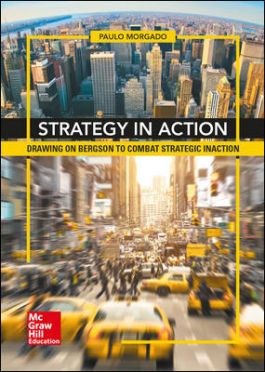Strategy in action. Drawing on Bergson to Combat Strategic Inaction.
CONTENT
1. INTRODUCTION 1.1. Research topic. 1.2. What is new about this project? 1.3. Expected contributions of this Project. 1.4. Relevant results from previous research 1.5 Structure of this document.
2. LITERATURE REVIEW 2.1. Strategy-as-Practice. 2.2. Bergsonian concepts applied to strategy. 2.3. Intuition. 2.4. Duration.
3. METHODOLOGY AND METHODS 3.1. Implications of Bergson’s theory for methodology and methods. 3.2. Method adopted in this project: qualitative interviews. 3.3. Analysis Process.
4. RESEARCH FINDINGS 4.1. Strategic intuition. 4.2. Strategic duration.
5. CONCLUSIONS 5.1. Key Contributions. 5.2. Contributions of this Project and further areas for research.
REFERENCESAs shown by the contrast on the cover, there are always architectural (building) and practical (dwelling) views of reality and of strategy in management, the underlying theme of this book, which reflects a doctoral thesis that aims to answer the following question: How can the formal gap between strategic decisions and execution be reduced? By clarifying the relations among the pairs Thought vs. Action, Intelligence vs. Intuition and Decision vs. Execution while strategizing, this book expects to contribute to a view that such a gap (vacuum) might not exist after all. By approaching corporate strategy from a practical perspective, instead of the classical views that link strategy to models fostering competitive advantage, Morgado explains the importance for strategy of two concepts fully developed by the French philosopher Henri Bergson: intuition and duration. Intuition is important because it helps to digest huge amounts of information, humanizes strategic decisions and helps to create “truly new” strategies. Duration, which measures qualitative time instead of chronological time — and is vital to generating intuition — is important because it replaces the idea of a supposed gap between decision and execution with the geometrical idea of a line, the thickness of which measures strategic quality. Since duration departs from movement, strategic action is brought to the fore as a crucial element of corporate strategy. Drawing parallels therefore with Bergson’s aphorism that states “time is invention, or is nothing at all”, this book explains that either strategy is (educated) action, or is nothing at all.
Based on more than twenty-four hours of in-depth interviews with fifteen CEOs from different countries and sectors who have faced multiple business challenges, this research project will help managers and academia to tackle the currently disruptive digital era, in which prompt and decisive actions are required. Morgado, with extensive experience in transformation and turnaround projects, provides business leaders with a complete framework for making decisions in these turbulent and uncertain times. This dynamic view combats management by paralysis or “attentisme” — the French word meaning to remain alert while doing nothing. It is against this strategic inaction that Morgado’s project attempts to give a timely wake-up call.

